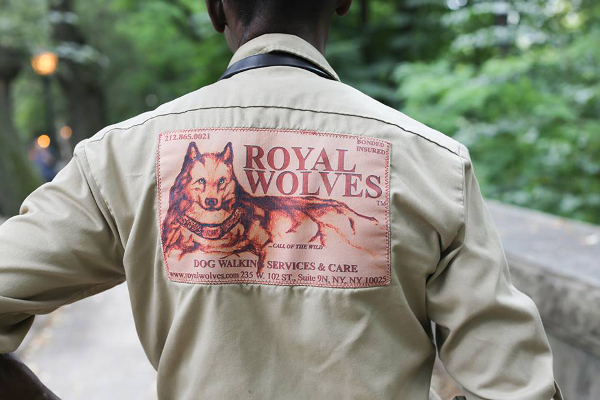September 2015
Yup & Nope: A one-minute (or so) look at brands in real life. Who’s doing it right and who’s doing it all wrong.
Royal Wolves
Every third friend I have on Facebook shares the Humans of New York posts. I saw one this week that I especially loved, in particular because it showed that branding is done in any size business. The story really speaks for itself. (Go ahead, go read it.) A New Yorker named Costello Caldwell took the leap to do work he loved. He decided to be a dog walker. Nothing necessarily remarkable about that I realize. But, he knew he “needed to distinguish” himself and it’s the way he positioned himself and his business that made me say ‘yup’.
He understood the deep love and bond that owners have for their dogs. The greatest need for someone hiring a dog walker is to feel reassured their dog is going to be safe and cared for. He tapped into this need by positioning himself and his company as protectors. He designed his own uniform and he, and now his employees, are decked out in outfits that look similar to army fatigues. (Any personal feelings on the military aside…) the instant impression one feels is that my four-legged family member is in the hands of a strong, capable hero.

Volkswagen
The obvious ‘nope’ brand right now is Volkswagen. A poster child for environmental sustainability and its Think Blue ‘clean diesel’ emissions technology has been found to have rigged the emissions testing. In a test site the emissions were as expected/promised. When out of a test site, i.e. when the steering wheel and accelerator pedal move, the emissions have been found to be 10 to 35 times higher. (The test workaround was pretty clever. It’s also pretty fraudulent.) It’s a deception that’s not only going to cost the company a whole lot of money, it’s going to hit them square in the brand reputation. Millions of people purchased a Volkswagen because they were sold on its eco-friendliness. It’s one thing to be lied to, it’s another thing to know you were lied to and a whole system was Macgyvered to protect that lie. That’s a brand deal-breaker.
When a brand like Volkswagen blatantly contradicts the promises and values it espouses, it’s concerning in another way too. It can add credence to a common argument from executives that the exercise, and even existence, of company values and promises (and other brand elements) is unnecessary ‘marketing fluff’. And in this case, that ‘fluff’ could turn into a liability. Instead of considering these brand elements as the sacred compass of the company’s decisions and actions, the Volkswagen example turns them into a farce; simply a marketing strategy the company doesn’t really have to live up to 100% of the time. For a company that has an entire division and sub-brand devoted to environmental efficiency and conservation around the world, it’s baffling and disappointing that enough employees in that culture could still decide ‘yes, let’s do this’. Corporations know the damage a broken brand promise can do. I hope that doesn’t mean they opt to protect themselves by not making one in the first place.